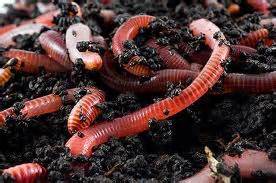Worm Composting Turns Kitchen Scraps into Garden Black Gold

Vermicomposting, aka worm composting, is the composting method that turns fruit and vegetable scraps, plus shredded newsprint into the richest growing medium you could want. Known by farmers and gardeners as “black gold” this soil, comprised of worm castings, will turn your garden from drab to fab.
Easy as 1, 2, 3…
It is extremely easy to start vermicomposting, not requiring any elaborate tools or equipment, and is virtually odorless. Just follow these easy steps:
Worm binStart with one of those Rubbermaid storage bins with a fitted lid. Drill out ventilation holes about four inches from the bottom of the bin. You’ll need to keep the bin covered so that it doesn’t dry out that fast and to keep it dark (remember worms like it dark). Place the bin in the shade if you keep it outside and protect it from excessive heat. You can even keep it in the garage, basement or utility room. Add the BeddingAdd shredded newsprint (not the glossy colored inserts, just the black and white), unbleached cardboard, hay, straw, dried grass clippings, dried leaves. You can also use rabbit poo, coconut fiber, sawdust or peat moss. Top with a handful or two of black dirt and then wet it down with water, and let sit for a day before adding the worms. Put the Worms to BedNext select your worms, which you can buy online, getting either the Red Wigglers (Eisenia fetida) or the European Nightcrawlers (Eisenia hortensis). Just be careful not to release the European night crawlers into the wild; but they do make great fish bait. Add about one pound of worms, and let them go to work. Feed Your Worm WorkersWhile the worms will eat the bedding, they do need a steady diet of vegetable matter. At first just feed them a handful of food, but as the population grows you can up that to about a quart of feed added once a week. Acceptable foods for worm composting include: tea leaves, fruit and vegetable scraps, coffee grounds, and egg shells, as well as bread and grains. Make it easier for them to process the food faster by running their feed through a food processor before mixing it into the compost. Don’t just toss the feed on top of the compost where it will dry out. Worm Composting MaintenanceIt’s best to keep the bin off the floor, resting it on a couple of blocks of wood or bricks. Make sure there is some light in the area and that you keep the compost moistened by sprinkling with water three or four times a week. As the bedding is turned into compost and the level of the fibrous material goes down, you’ll need to add more bedding materials. |
Mistakes to Avoid
While worm composting is really easy, in addition to regular maintenance and feeding you will need to avoid some things:
- Don’t overfeed – When fed more than they can process fast enough, you can end up with unpleasant odors, as well as hot compost, which will kill your worms.
- Don’t feed certain foods – Citrus, milk products, fats, meats and fish, dog or cat feces, sticks and branches.
- Avoid freezing – In the winter move the bin inside to avoid any chance of freezing.
- Avoid overheating – Don’t let the temperature of the compost get above 90° Fahrenheit.
Harvesting the finished compost is just a matter of gently separating the compost from the majority of the worms. Once the worms are separated from the compost, refill the bin with fresh bedding material and place the worms in their new home.
The entire worm composting process usually takes about three months to six months, after which you have the best growing medium you could want. Plus its
better than most store bought mediums too.
Return from Worm Composting to Backyard Farming





New! Comments
Have your say about what you just read! Leave me a comment in the box below.